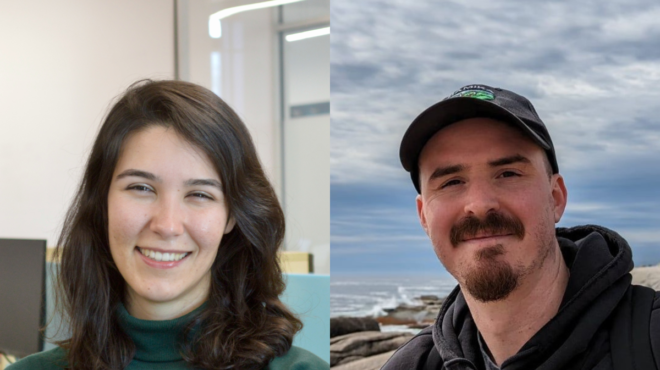
Architecture and planning students building a sustainable future
Renita Kralik (BSc’17) and Gabriel Malo are getting hands-on experience and learning how they can tackle climate change as future architects and planners.
By Stephanie Paterson
A passion for sustainability and the desire to act is what led Renita Kralik (BSc’17) and Gabriel Malo to the Faculty of Architecture and Planning at Dalhousie. But it was the opportunity to engage in hands-on learning and explore sustainable design and policy that motivated them to make a difference. Now, they’re learning how they can build a more sustainable future as architects and planners.
Creating a sustainable future
As a Master of Planning student, Kralik has gained hands-on experience advocating for sustainable policy. She had the opportunity to work with the Municipality of the District of Lunenburg to draft more cohesive and sustainable policies for the community. “It was a great opportunity to see that when planners consistently educate communities on sustainable initiatives, the communities will start to implement those initiatives.” Kralik says the experience helped her recognize the important role planners play in the future of communities. “The job of a planner is to build communities for the future and it’s up to us to advocate for including climate change adaptation and sustainability in our policies.”
Malo says his passion for sustainable design is rooted in the need to think outside of the box. “I feel we are at a crossroads when it comes to climate change, and we have to think of better solutions.” Now a student in the Studies program, Malo says he can see how architects can play a significant role in addressing climate change. “Architects are problem solvers by nature,” he says. “They see a problem and they use creativity and innovation to build something better for society.”
When Kralik, Malo and their classmates graduate, they will inherit a climate emergency. The Faculty of Architecture and Planning is committed to equipping them with the tools and experiences they will need to meet these challenges but help from alumni and friends goes a long way in realizing this goal. Donations to the faculty and its two schools through the Dalhousie Fund will prepare future leaders to play an active role in building a sustainable world.
Building the foundation for change
To be strong planners, Kralik says it’s important to learn about climate change and the impact it has on communities. “If we’re not talking about these issues and we’re not educating ourselves on these issues there’s no way we can address them.” She recalls a unique opportunity to learn more about the impact of climate change as part of the School of Planning’s Earth Day celebrations. Working with a team, she was challenged to use video to tell the story of an urban planning issue within the community related to the environment. “It was a really interesting opportunity to learn about planning issues in the local area and research innovative solutions,” she says. “As future advocates, we have a responsibility to continue educating ourselves and seeking out opportunities.”
These are the kinds of transformative experiences that alumni support makes possible. With this help, the faculty can offer more expert lecture series, public events and hands-on opportunities that tackle real projects in the community. This programming is key to helping students create innovative design solutions that address climate change.
Malo says learning about climate change and sustainability has influenced his designs and how they will come to life. “In the Free Lab I had the opportunity to work with a team testing alternative building materials to build a bench,” he says. “I learned how to think outside the box and use green materials in contemporary projects.” Malo says this experience has helped him develop skills that he’ll take with him into his career, and he hopes to see more opportunities to explore sustainability. “By learning about climate change in school and developing skills to address that, we’ll shape the future of architecture.”
An opportunity to grow
Students like Kralik and Malo will go on to become planners and architects who have a hand in building sustainable cities and communities. Kralik says it’s important for students to have opportunities to learn about climate change to prepare them for the future. “Having tools and a good education will go a long way in setting us up to advocate for change in both policy and building design.”